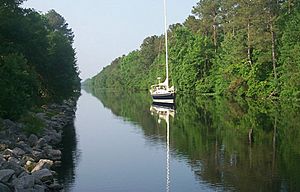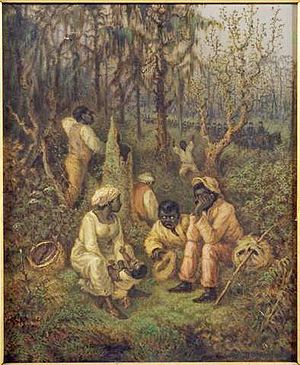Moses Grandy facts for kids
Quick facts for kids
Moses Grandy
|
|
|---|---|
| Born |
Moses Grandy
1786 |
| Died | Unknown |
| Occupation | Author and abolitionist |
Moses Grandy (c. 1786 – unknown) was an African-American author and abolitionist. For most of his early life, he was an enslaved person. When he was eight years old, he became the property of James Grandy. Two years later, he was hired out to work for others.
Moses earned money, but it was collected for James Grandy. He helped build the Great Dismal Swamp Canal and learned to steer boats. This skill made him the captain of several boats. He transported goods on the canal and Pasquotank River. This job meant he had better food, shoes, and clothes.
He was allowed to keep some of his earnings. Moses tried to buy his freedom twice, but his owners kept the money. They still held him as a slave. Finally, an honest man agreed to buy him. Moses earned the money to buy his freedom a third time, and this time he succeeded.
During his life, he saw family members, including his first wife, being sold. This happened just eight months after they were married. Once he was free, he worked hard to earn money to free his wife and children. He managed to free his wife and his 15-year-old son. He told his life story, which was written down as Narrative of the Life of Moses Grandy, Late a Slave in the United States of America. He hoped this book would help him buy the freedom of more family members.
His slave narrative and other similar books were read in the United States and other countries. They helped people understand slavery better. These stories also helped the abolitionist movement grow.
Contents
Early Life in Slavery
Moses Grandy was born into slavery in Camden County, North Carolina, in the late 1700s. He was owned by Billy Grandy and grew up with Billy's children.
His family was broken apart when his siblings and father were sold. His mother sometimes hid her children to stop them from being sold. Grandy saw his mother and other people being treated very badly. He himself was often beaten and did not have enough food.
Life as an Enslaved Person
When Moses was 10, James Grandy hired him out to work for others. One man he worked for, Jeremy Coate, hurt him badly. Another owner, Enoch Sawyer, gave him so little food that Grandy ground cornhusks to eat.
By age 15, Moses was managing ferry crossings in Camden, North Carolina. He was in charge of moving the ferry across a swampy river. He lived on Sawyer's farm. To keep his feet warm, he put them in heated mud where hogs had slept. He visited his mother, who lived in a cabin in a remote area, after she became too weak to work. All the money Moses earned was kept for James Grandy until James turned 21.

Grandy worked transporting goods to Portsmouth and Norfolk, Virginia. He also ran boats and cut timber for the Great Dismal Swamp Canal. Even though he was skilled at managing boats, he also worked as a field hand. For a time, he was a lookout for his boss, who gambled.
Later, Grandy worked for Richard Furley. Furley let Grandy take on extra work at night and on Sundays. Grandy got a share of the money he earned. James Grandy then called back all the enslaved people he had rented out. He allowed Moses to continue extra work but took twice as much of his earnings as Furley had.
Over the years, Grandy learned navigation and other skills. He became very good at his jobs and was valuable. He was a strong, tall man who worked long hours. He thought carefully about his actions to avoid making his situation worse. He decided not to run away or rebel. Grandy knew that he would have a better chance of success if he allied with an honorable person.
In the winter of 1813, Charles Grice, James Grandy's brother-in-law, wanted to hire Moses. Moses was 21 years old. He became the captain of up to four boats. These boats carried goods on the Great Dismal Swamp Canal and the Pasquotank River. These were the only waterways between Elizabeth City, North Carolina, and Norfolk, Virginia, after the British blocked Chesapeake Bay during the War of 1812.
When he started working for Grice and Moses Myers, he got better food, shoes, and a coat. His pay was now based on the value of the goods he successfully transported.
Grandy "married" a woman he loved very much. Enslaved people could not legally marry. She lived on a different farm. One day, as he was moving his boat, he heard a woman call his name. He saw his wife in a group of enslaved people being moved to a boat. She was being taken south, far away from him. He was so upset he lost his grip on the pole and fell into the water. She called out, "I am gone." Grandy made it to shore. He learned that her former owner needed money and had sold some of his enslaved people. There was nothing Grandy could do to stop it. They had been "married" for eight months. They never saw each other again.
Attempts to Buy Freedom
Moses Grandy earned enough money to buy his freedom, but two different owners stole his money.
First, he made payments to James Grandy for $600 to buy his freedom. He received receipts for these payments. After the last payment, James Grandy asked for the receipts. He said he would sign the papers to free Moses. Moses gave him the receipts. But James tore up the receipts and went to a tavern instead of the courthouse. James sold Moses to another owner, Mr. Trewitt, and kept Moses's money. James's sister and her husband, Charles Grice, were angry. They took him to court, but it failed.
Moses was now owned by Trewitt and had lost his savings. He was hired out again. Trewitt kept a share of the money Moses earned. Moses Grandy saved another $600. When he had saved what Trewitt demanded for his freedom, Trewitt took the money but did not free him.
Grandy felt very sad and hopeless. His owner threatened to sell him, which would separate him from his second "wife." His owner realized how much money he would lose if he sold Moses. So, he withdrew the offer to sell him.
Surprisingly, one of the harshest slave overseers, Mr. Brooks, was outraged by the second time Grandy's money was taken without freeing him. He told Grandy that a man named Edward Minner might be able to help. Grandy told his story to Edward Minner, a white man he believed to be honorable. Minner agreed to buy Grandy for $650. Grandy would then earn back the price of the sale to gain his freedom.
By the end of three years from the time he [Minner] laid down the money, I entirely repaid my very kind and excellent friend. During this time he made no claim whatsoever on my services; I was altogether on the footing of a free man, as far as a colored man can there be free.
When...my freedom was quite secure, my feelings were greatly excited. I felt to myself so light, that I could almost think I could fly; in my sleep I was always dreaming of flying over woods and rivers. My gait was so altered by my gladness, that people often stopped me, saying, "Grandy, what is the matter?" I excused myself as well as I could; but many perceived the reason, and said, "O! he is so pleased with having got his freedom."
Freedom and Family
With papers proving he was free, Grandy moved to Providence, Rhode Island, as Minner suggested. Within two months, he missed his family and returned to North Carolina. He worked to earn money to free his family. Minner died a year later. Grandy then returned to the safer North to earn money for their freedom.
While in the North, people liked him very much. George Thompson, an abolitionist, said Grandy's kindness and spirit were "truly remarkable." To earn money for his family's freedom, he told his life story. This story, including the emotional and physical pain he suffered, was published and sold. He believed that white people who had harmed his family and other enslaved people would face God's judgment.
Grandy wanted to buy the freedom of his "wife," four of his six children, and four grandchildren. One of his daughters earned enough money to free herself and one of her sisters.
In 1840, Moses Grandy was listed in the Boston Directory as a laborer. He lived with his wife and four young men. Grandy worked in coal yards, sawed wood, and loaded cargo onto ships. Later, he became a seaman on the ship James Murray. There, he earned the same pay as white sailors, about $16 per month (equivalent to $469 in 2022). This job gave him a stable income and provided room and board. He made more money than he likely would have on land. By saving his earnings from the James Murray, he bought his "wife" for $300. He also made arrangements for his 15-year-old son to be freed.
Abolitionist and Author
Grandy believed that abolitionists in the United States, England, and Ireland were important in the fight against slavery. In 1842, he traveled to London. He wanted to help the abolitionist cause by sharing his firsthand experiences of the cruelties of slavery in the United States.
Since he could not read or write, he told his life story to fellow abolitionist George Thompson. This autobiography, Narrative of the Life of Moses Grandy, Late a Slave in the United States of America, was published in 1843. The book's goal was to raise money to buy the freedom of his remaining children and other family members. A second edition was printed the next year. His book was one of many slave narratives that helped the abolitionist movement grow.
His descendant, Eric Sheppard, who wrote the book Ancestor's Call, estimated that Moses saved a total of $3,000 in 1844 currency (equivalent to $94,000 in 2022).
Legacy
In 2006, a part of Virginia State Route 165 was named Moses Grandy Trail in his honor.
See also
 | Anna J. Cooper |
 | Mary McLeod Bethune |
 | Lillie Mae Bradford |


